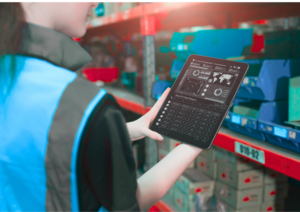What is Retail Inventory Management?
Retail inventory management is the process of monitoring and regulating products from supplier to customer, aiming to maintain optimal stock levels to meet demand and enhance customer satisfaction. Inadequate management of retail inventory can create a range of adverse effects for organisations, including inaccurate stock data, that can ultimately impact customer satisfaction and business profitability, which can be detrimental to success.
Inventory Management Software for Retail Warehousing
Manual inventory management efforts are feasible, but often prove laborious and costly. The most efficient and common approach to effective inventory management is the adoption of appropriate software solutions, often complemented by reliable hardware, such as robust barcode scanners and label printers. This integration aids the streamlining of operations by automating tasks and meticulously tracking and tracing products in real-time across all storage and distribution facilities, with minimal effort required.
Software solutions uniquely tailored for retail inventory management play a vital role in assisting organisations with efficiently planning, forecasting, ordering, and storing stock. Through the scan of a barcode, integral data, including stock levels and sales data, can be instantaneously captured and stored securely within the system. This information is readily accessible on any device that is connected to the system, from any location, streamlining the process of verifying product availability and location.
Sophisticated software solutions, like StockAssist Industrial, offer advanced reporting capabilities, which can be invaluable to retail organisations. Easily accessible reports enable organisations to gain insight into sales patterns, providing a comprehensive view of product performance. With the ability to identify top-selling products, as well as less popular items, businesses can make well-informed decisions based on real evidence, which can mitigate the risks associated with overstocking and understocking. Real-time reports also enable organisations to anticipate how seasonal fluctuations might impact sales.
Benefits of Retail Inventory Management Software
The success of an organisation can depend greatly on how its stock is handled and managed, highlighting the critical importance of proficient retail inventory management. For most retailers, key inventory management objectives typically revolve around cost reduction, enhanced stock visibility, and increased sales along with customer satisfaction. Employing robust inventory management software and tools can significantly elevate organisational performance and help with the attainment of these goals. Some of the primary advantages that inventory management software offers to retailers are:
Reduced Risk of Overstocking
Without retail inventory management software or tools in place, organisations are vulnerable to overstocking. Excessive stock accumulation can lead to cash and storage being tied up as unsold stock becomes obsolete. Products with expiry dates may reach their expiration, rendering them unsellable to customers, and resulting in significant losses to profits.
There are various factors that could result in products failing, such as shifts in trends and seasonal changes. Implementing effective inventory management software empowers organisations to analyse sales and inventory data to determine the turnover of goods, make data-driven predictions, and accurately forecast demand. With this valuable insight, organisations can make informed decisions regarding stock replenishment, and timings of promotions and discounts to help stock movement.
Reduced Risk of Understocking
Understocking also presents a challenge for many retailers. Inadequate inventory levels to meet demand could lead to dissatisfied customers and tarnish a business’s reputation, impacting future sales. A robust inventory management software solution is essential for mitigating the risk of understocking in retail operations. Effective software accurately monitors product usage and sales and provides insightful reports that enable well-informed decision making. With reliable data, organisations can decide on product replenishment strategies, identify when to discontinue items, and assess the impact of changing seasons on sales patterns. Retail organisations can additionally analyse popular distribution channels. Through proactive product management, usage tracking, and demand forecasting, retail businesses can align with customer expectations, increase sales, and enhance both customer satisfaction and loyalty.
Accurate Real-Time Product Tracking
With the real-time tracking capabilities of inventory management software, retail organisations can trace and distribute products efficiently. The FIFO (first in, first out) method can be utilised by retailers to distribute products with the shortest expiry dates first. Advanced software solutions like StockAssist Industrial are equipped to notify system users of products that are near their expiry date, so these can be prioritised for use first. This proactive approach significantly minimises wastage and associated costs.
Retail inventory management software and tools play an increasingly important role in expediting and optimising operations and processes by providing valuable insights into product locations, quantities and sales history. With access to real-time product information and comprehensive reports, retail organisations can ensure efficiency in their inventory management, leading to improved operations, cost reduction, and an enhanced customer experience.
Find out more about our GS1 UK approved software solutions today.




